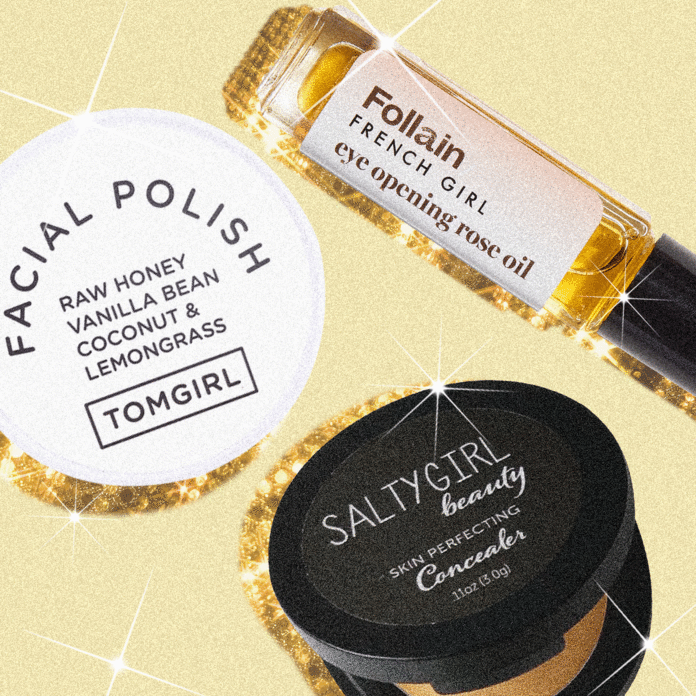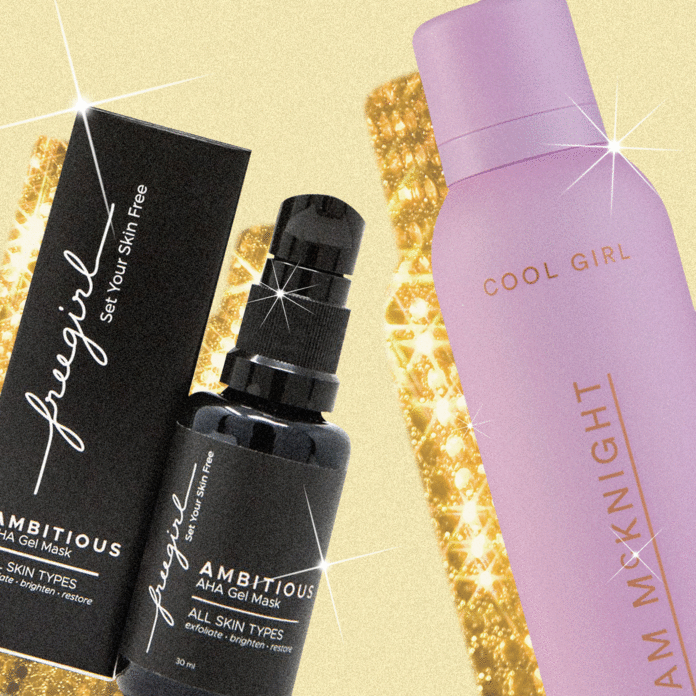I'm a Full-Grown Adult and Can't Stop Buying Products With "Girl" in the Name
I own a product called French Girl Eye Opening Oil. I spent $42 on this tiny, 9 ml vial for a variety of reasons. I like the minimalist brand aesthetic, enjoy the feel of oil on my skin, and — perhaps most importantly — am both consciously and subconsciously gripped by the evocative power of the word "girl."
Given the choice between an oil marketed toward a "busy working mom" and an oil marketed toward "the girl who's always on the go," I will choose the latter, even though I most assuredly could be more accurately described as the former. I don’t see this as a symptom of self-loathing so much as a rejection of sitting quietly in my assigned seat as a “woman.”
RELATED: The Mid-30s Awkward Phase No One Warns You About
"Girl" is a powerful marketing tool because it allows us (or me, at least) to feel the magical sense of possibility we held before getting blasted with the kind of labels that seem to eliminate any remaining options: "wife," "mother," "Ella's mom." As a “girl,” I could be anything. Even if the thing I was trying to be didn’t work out, I had plenty of time to figure out something else, plenty of time to become someone else. The girls evoked by beauty products live within a wide expanse of what will be, while the women who buy those products live squarely in the mundane reality of what is.
Don’t get me wrong. “Girl” still smacks of condescension and sexism when applied to me by others (mostly men). When picking up a friend for dinner, I bristle when the friend’s husband says, for example, “You girls have fun!” In this context, the husband uses “girl” to liken us to children being gifted a playdate. When viewed from this perspective, my buying into the lure of “girl” beauty products feels gross, like internalized sexism I’m too weak to shake.
But “girl” feels different when I use it to refer to myself. It feels a little like an act of reclamation.

I’m a writer, but I didn’t realize this until my mid-30s, until I was firmly entrenched in woman territory, and it took me years before I could even call myself a “writer.” I felt ashamed by my audacity to strive toward something new and uncertain, no longer shielded by the protective armor of girlhood. As girls, we are forgiven for wanting; as women, not so much.
There's nothing radical about pointing out the marketing influence of a word that evokes youth to sell a product to women. There's Maybelline's Babylips balm, Estee Lauder YouthDew perfume, Charlotte Tilbury Youth Glow Primer, Bare Minerals Ageless Genius Neck Cream, etc., etc., infinity. But for me, these products — which, like the eye oil, are selling a false promise of immortality, or maybe just a false promise of eternal sexual desirability — fail to lure me into clicking "purchase now" in the same way that almost any application of the word "girl" does. I must not be the only woman who feels this way, because I see “girl” everywhere. There's Cool Girl Barely There Hair Mist, Tomgirl Facial Polish, FreeGirl Ambitious AHA Mask, Salty Girl concealer. The list goes on.
To best understand my preoccupation with “girl,” let’s do a little close-reading. What do all of these “girl” products have in common? My diminutive bottle of French Girl Eye Opening Oil utilizes the word “French,” which to American consumers of a certain bent connotes effortlessness, “natural” beauty, and an impossible-to-replicate chicness. Think choppy bobs mussed from hot sex in an artist’s loft. Striped tees that simultaneously scream school girl and unattainable goddess. Lean body, coltish legs.
Cool Girl Barely There Hair Mist “creates tousled waves and volume” seemingly out of thin air. Never mind that my “locks” can be easily contained by my 5-year-old’s mini pigtail elastics, this Mist will assuredly give me Gisele hair. And because it’s “barely there,” I needn’t feel like I’m trying particularly hard (which is obviously something cool girls don’t do).
Tomgirl Facial Polish is fun because it plays with a word that doesn’t have a clear meaning. Left to my own devices, I imagine tomgirls are like tomboys in that they wear T-shirts and jeans, but because they’re tomgirls, their T-shirts and jeans cling to attractive curves. Tomgirls can pull off high, unflattering necklines, shapeless sweaters, and chunky Blundstone boots because tomgirls are beautiful without knowing it. Free girls are allowed to be ambitious, to reach for what they want. They use AHA because a vegan chef influencer mentioned AHA in a ManRepeller article, not because of a male-gaze enforced fear of aging.
As for salty girls, they are surfers. And as such, they don’t give a shit about anything but catching bitchin’ bombs. If you want to know what those are, Google “surfer slang” like I did, but do so knowing you are not a salty girl and maybe not a cool one either.
The point is that “girl” communicates not just youth, but effortlessness, a concept that’s particularly alluring for me, at 38, because almost everything I do requires effort. Effort to drag myself out of bed at 5 a.m. to nurse the baby, effort to restrain myself from throwing a plate at my husband when he says “I’m sorry you feel ____” instead of “I’m sorry I did ____,” effort to inject sprightly interest into my voice when my kid says, “Mom, watch! Mom, did you see?” Effort to “soften my face” when doing bicycle crunches alongside a smiling online yoga instructor, effort to be witty on Twitter for the sake of platform-building and sustaining a writing career. All of this effort merely to inhabit the life of a grownup. So to imagine myself a free, cool, salty, French tomgirl, one who succeeds at whatever she wants to do and does so without even trying, well, it’s endlessly enticing. It’s unquestionably worth the price — which is whatever the “girl” product costs, but also of clinging to the concept of girlhood to get through.

Consider, though, that while the adjectives preceding “girl” help imbue these products with effortlessness and potential, it’s “girl” itself that does the heavy lifting. Imagine Cool Woman Barely There Hair Mist or French Woman Eye Opening Oil. Both “cool” and “French” lose something when paired with “woman,” which feels laden, more final, more established.
There’s something profoundly sad about the fact that I feel more free as a “girl” than a woman. After all, there will come a point at which I will have to choose a new aspirational image, a point at which I can no longer access “cool girl” style, and then what?
My cousin snapped an actual candid of me the other day when I was editing this piece, and there’s absolutely nothing “girlish” about the photo. My mouth is tight with concentration and my skin looks tired and thirsty. My short hair is flat. I look like what I am, a mother of three who goes to bed at 8:30. The image is pretty meh, pretty listless. It makes me want to sprint away from womanhood if this is how it looks. But it’s just an image.
RELATED: This Herbal Tonic Feels Like Splashing Younger Skin Right Onto My Face
The problem plaguing both “girl” and “woman” is that the image always seems to matter more than the reality. The actual me wouldn’t trade places with her pre-Zoloft, external-validation addicted, floundering girl self for all the French Girl serums in the world. What I’ve lost in collagen and skin elasticity I’ve gained in self-knowledge and the confidence to challenge what doesn’t feel right.
But unfortunately, our culture still tells women to disappear as we age, so until women as people matter more than women as images, I’ll keep on choosing “girl.” I’ll keep choosing to lay claim to the power and agency reserved for only young women. By choosing “girl,” I choose to say fuck that.

